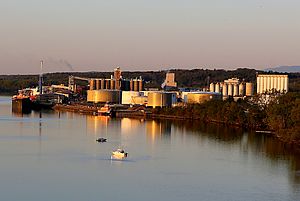LCC Praises Decision Requiring Full Environmental Review of Oil Heating Facility

The Port of Albany is a focal point in the oil transport issue. Photograph by Bill Morrow.
On May 21, the New York State Department of Environmental Conservation (NY DEC) announced its intent to rescind a Negative Declaration and Notice of Complete Application for an air pollution permit in the Port of Albany. Global Companies LLC of Massachusetts had sought a state air pollution permit modification so it could install an oil-heating facility. This would have allowed Global to transfer thick tar sands crude oil from rail cars to storage tanks, and then on to ships in the port. Global transports oil from the mid-continent to the coasts for distribution to refiners. A modified permit would lead to increased oil train traffic along Lake Champlain. Trains carrying the oil would travel more than 130 miles along the shore of Lake Champlain, including more than 100 miles of which are inside the Adirondack Park. The rails pass through a dozen Adirondack communities and cross several major rivers that feed the lake.
"We believe that NY DEC has an obligation to protect our waterways and public health and safety, so we are pleased it will be taking a much more careful look at the potential environmental consequences of a derailment in sensitive locations," said Lori Fisher, Lake Champlain Committee Executive Director. "A spill along much of this line could significantly pollute Lake Champlain. That means water pollution contamination of a drinking water supply for more than 180,000 area residents. That's not a local impact, confined to Albany. That's an interstate and international impact."
Tar sands oil is thicker than the North Dakota Bakken crude oil currently being shipped by rail through the Adirondacks to Albany. It must be heated before it can be pumped in cold weather and it sinks in water, making clean-up virtually impossible.
NY DEC identified significant proposed project changes and new information submitted after the initial ruling that must be considered as part of a full environmental review of the project.
"Our review of Global's application has focused on protecting the health of people living around the facility and the environment," said NY DEC Commissioner Joe Martens. "This community has voiced its concerns and raised some serious issues. Through the environmental review process, DEC will continue to evaluate the project's impacts."
NY DEC received 19,000 comments during the public comment period. The comments raised significant issues that meet the state regulatory standard to rescind the initial declaration. Global has ten calendar days to respond.
The Environmental Protection Agency (EPA) previously sent a letter to NY DEC requesting a 45-day window to review any permits DEC plans to issue for expansion of an oil-heating facility in Albany. EPA previously challenged some of the air pollution numbers provided by Global and noted in their most recent letter that these concerns needed to be addressed prior to issuing a permit.
